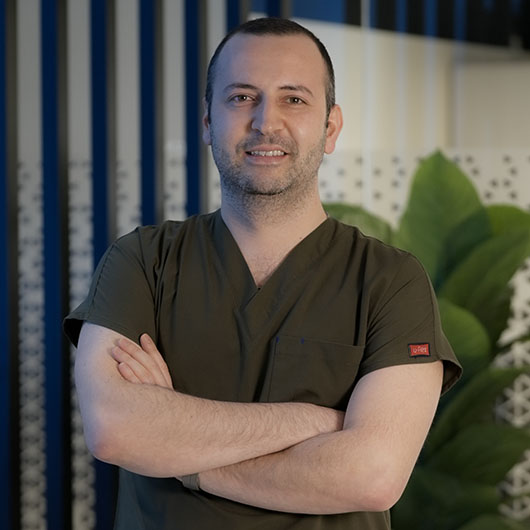Implant Treatment
Implant treatment is a dental procedure used to address tooth loss. This treatment is performed to replace missing teeth and restore the natural tooth structure of the patient.
Implant Treatment
- What Is Implant Treatment?
- When Is Implant Treatment Required?
- What Are Types of Implants?
- How Is Implant Treatment Performed?
What is Implant Treatment?
Implant treatment is the surgical placement of artificial roots, called implants, in the jawbone in the place of the missing teeth. Additionally, it includes the placement of prostheses resembling natural teeth such as porcelain or ceramic. This treatment method provides aesthetic and functional elimination of tooth deficiencies. Implants are the artificial roots in the form of screws or nails, which are usually made of biocompatible metals such as titanium. The implants integrate into the bone after being placed in the jawbone. This process is called “osseointegration”. Osseointegration ensures that the implant is firmly attached to the bone and forms a stable foundation.
Implant treatment provides several advantages. For instance, the implants offer a more natural appearance than other traditional prostheses. Balancing the load on the jawbone, they also help prevent bone loss. Moreover, they improve chewing function and make speech easier as they form a strong tooth base. However, the implant treatment is not suitable for everyone. The implant treatment may not be possible in some patients with insufficient bone density or oral health problems such as gingival disease. For this reason, an individual evaluation is a must for each patient. Patients can learn whether they are suitable for the implant treatment or not by consulting a dentist or dental implant specialist.
When Is Implant Treatment Required?
Single Tooth Loss:
An implant is placed in the jawbone for a missing tooth and a temporary or permanent prosthesis can be used to replace the missing tooth. This procedure allows the protection of other teeth and normal chewing function.Multiple Tooth Loss:
Bridge prostheses can be applied using implants for multiple tooth loss. Implants form a solid base that supports the dental bridge. Thus, they can replace the missing teeth with no need to cut or weaken other teeth.Complete Toothlessness:
Implant-supported fixed or removable dentures can be used for complete toothlessness. The implants allow the dentures to be held securely and prevent the dentures from moving or gliding. In this way, a natural chewing function and aesthetic appearance can be achieved even in the case of complete toothlessness.Unsupported Complete Denture Problem:
Implant-supported complete dentures can be recommended to some patients who experience discomfort with the use of conventional complete dentures. The implants allow the dentures to be held securely in the mouth and prevent the dentures from moving or gliding.
What Are Types of Implants?
Endosteal Implants:
These types of implants are titanium screws or nails inserted into the jawbone. They are usually designed in the form of tooth root. Endosteal implants are the most commonly used implant types.Subperiosteal Implants:
Subperiosteal implants are specially designed implants placed on the jawbone. These implants are placed over the jawbone, not below it. Subperiosteal implants may be preferred for patients with insufficient jawbone volume.Zygomatic Implants:
Zygomatic implants are the long implants placed in the zygomatic (cheek) bones. These implants are used for patients with insufficient jawbone volume. Zygomatic implants are also used to provide more support and hold the dentures stably.All-on-4 and All-on-6 Implants:
Using four or six implants, a complete upper or lower dental prosthesis is supported in these methods. These solutions aim to reduce the cost and shorten the duration of treatment by reducing the number of implants in cases of complete toothlessness.Mini Implants:
Mini dental implants are smaller implants. They are generally used in patients with less bone volume or narrow tooth gaps. Mini implants are also preferred to hold the complete dentures securely.One-Piece and Two-Piece Zirconia Implants:
The zirconia implants are the implants made up of zirconium dioxide instead of titanium. This particular implant can be used for patients who are allergic to metal or do not want to have metal implant. They can be designed as one-piece or two-piece implants.Ramus Frame Implants:
These are the specially designed implants that are placed in the back of lower jaw bone and provide implant support. The ramus frame implants can be preferred when jawbone is insufficient, or the implants cannot be placed in other areas.
How Is Implant Treatment Performed?
The implant treatment is a process consisting of the following steps:
Evaluation and Planning:
The implant treatment process begins with examination and evaluation of a dentist or dental implant specialist. The teeth and jaw structure are evaluated in detail. Performing necessary x-ray and imaging methods, quality and volume of the jawbone as well as other anatomical factors are analyzed. Next, treatment plan is made. Moreover, type, number and location of the implants are decided, depending on need, situation and preference of the patient.Surgical Procedure:
The next step of the implant treatment is the surgical procedure. It is performed under local anesthesia and patients do not experience pain or discomfort. Implants are placed over the jawbone during the surgical procedure. The implants are screwed, nailed or placed in the jawbone by means of practicing the previously decided proper method. Patients’ recovery process begins after the procedure.Recovery Process:
Recovery process is required for osseointegration of implants with the jawbone. This can take 3 to 6 months in general. Following the osseointegration phase, the implants properly and securely fit. Temporary dental prostheses or other temporary solutions can be utilized during this process.Temporary and Permanent Restoration:
Following recovery period, temporary dental prostheses are removed and permanent restoration process begins. After the preparation, permanent dental prostheses or crowns are placed over the implants. Shape, size and colors of the prostheses are designed in the way that they will be consistent with natural teeth of patients. The treatment is completed after the dental prosthesis or crowns are properly placed.Follow-up and Treatment:
It is important to have regular follow-up and care after the dental implant treatment is completed. Dentist or dental implant specialist periodically carry out dental checkups to follow-up health and function of the implants. They also provide recommendations about daily oral hygiene, regular toothbrushing/flossing and implant cleaning.
Doctors
List of doctors under the HOP of the corporation























